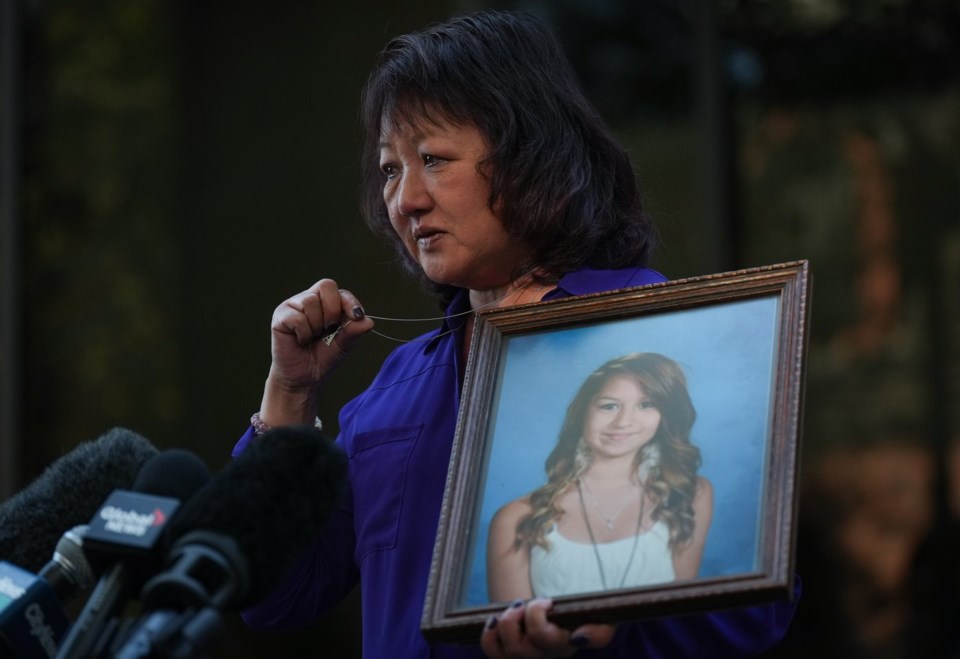WASHINGTON — When B.C. teenager Amanda Todd sat in front of her computer and detailed the relentless bullying and extortion she'd faced on social media, it sent a shock wave to parents around the world. Twelve years later her family is joining others in a lawsuit alleging those dangers persist for kids online.
Only a few weeks after posting the viral video, 15-year-old Todd died by suicide in October 2012.
"Why isn't life safer for kids?" her mother Carol Todd asked, in an interview from Port Coquitlam. "Why are there more kids being harmed?"
The lawsuit was filed in the Los Angeles County Superior Court earlier this month on behalf of 11 families — two of whom are Canadian — who say their children suffered physical and mental harms because of social media platforms. It alleges that some of the world's largest technology companies knowingly designed and marketed defective products to kids in order to boost engagement numbers.
Some kids took their lives after they were targeted by strangers in sextortion, where a person threatens to expose sexually compromising information or images. Others developed eating disorders, depression and had to be hospitalized.
The lawsuit names tech juggernauts Meta — the parent company of Facebook and Instagram — along with Snapchat, TikTok's parent company ByteDance, Discord and Google, which owns YouTube.
"What happened to these children was neither an accident nor a coincidence. It was a foreseeable result of deliberate design decisions that they make to maximize engagement over safety," said Matthew Bergman, founding attorney of the Social Media Victims Law Center, which is handling the case.
"They make money by selling advertising to kids and selling kids' data."
Google said the allegations are not true. Spokesperson José Castañeda said Google built services and policies in conjunction with experts to provide age-appropriate experiences and parental controls.
The other companies did not provide comment. Their websites generally say they have age limits and prohibit content that causes harm. TikTok's website says it moderates content "that involves goods or activities that may be risky, addictive, dangerous, fraudulent, or otherwise require a higher degree of care."
A mounting number of lawsuits have been brought against tech giants alleging children are being harmed by social media exposure.
The latest lawsuit points to internal documents and research, including from the Facebook Papers, which were released by a whistleblower. It quoted Meta documents saying, "the young ones are the best ones. You want to bring people to your service young and early."
Todd began using Facebook in 2008. The platform was new and her mother, like most people in the world, thought it was designed to be fun and safe. Todd soon became trapped in years of extortion.
Aydin Coban, who is Dutch, started blackmailing Todd with a photo taken when she'd lifted up her shirt in a chat. His Canadian trial heard Coban used 22 online aliases to harass Todd over two years, starting when she was 12 years old.
Coban was convicted of harassment and extortion in Canada. He was also convicted in the Netherlands on similar charges involving the online extortion of 33 young girls and gay men.
The lawsuit alleges there were several steps Meta could have taken to make its product safer for minors and could prevent strangers from reaching out to children.
The lawsuit includes the family of another Canadian teenager who died more than a decade after Todd's case captured headlines across the country.
Harry Burke went to his father for help after the 17-year-old in Prince Edward Island sent an explicit photo on Snapchat and was sextorted for money.
The lawsuit said his parents planned to go to RCMP in the morning but, that night, Burke died by suicide.
The lawsuit also represents American parents who say their children became depressed and suicidal because of the social media platforms.
U.S. Surgeon General Vivek Murthy said earlier this year that the mental health crisis among young people is an emergency "and social media has emerged as an important contributor," calling for a tobacco-style warning label on the platforms.
Bergman said the lawsuit argues that "these are dangerous products … and foreseeably cause harm to kids." They are designed to get increased engagement from youth by showing more extreme material while encouraging them to interact more with the platform, he said, and it leads to addiction and psychological damage.
The concern around social media safety has prompted a response from lawmakers on both sides of the border.
Canada's Liberal government has been trying to pass an online harms bill. It has faced criticism, including from the Opposition Conservatives, who say it will create a new bureaucracy.
The U.S. is also moving ahead on its own Kids Online Safety Act to create a "duty of care," a legal term that requires companies to take reasonable steps to prevent harm. That bill passed in the Senate but it's less certain what will happen in the House.
Carol Todd encouraged parents to connect with resources like the Canadian Centre for Child Protection and to make sure their kids know they can talk with an adult if something happens.
She said it was important to join other families in the lawsuit to make social media safer for children.
"I can't bring my child back … it's to keep other kids safe."
This report by The Canadian Press was first published Oct. 24, 2024.
— With files from The Associated Press
Kelly Geraldine Malone, The Canadian Press



